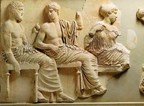During the fifth century BC, the Athenian democracy developed as an institution having certain interesting phenomena which are now helpful to understand our modern political systems. The most important point is to know how the structures of the state were formed, how they worked and finally how they were influenced and affected by the powerful and influential political groups. The success of a political system cannot be accessed only by having checks and balance of the technical skills through which a constitution is made. Political philosophy cannot help you to understand a flourishing practical system and cannot even assist you to explain its importance and value. The basic need for a political system to work smoothly is that it must be appropriate for the society which is going to use it. In addition to this a political system must be more attractive than any possible alternative. The secret behind the success of a political system is its ability to face every situation, the better and the worst and to come up to the mark under good or bad times. In any condition the institutions must remain intact. The actual strength of a system lies in its daily business which proves to be a precise indication of the resources which it can use to shield or protect its institutions whenever there is a threat. In order to understand a political system it is necessary to study the constitution and to know how the constitution was formed.
Unfortunately, the literary sources from fourth and fifth century available to date are not much satisfactory to provide information on various aspects of the political system. We cannot get any beneficial information about implementing democracy in our working system. The writer of The Athenian Constitution, the pseudo Xenophon, or Old Oligarch, describes about this. He starts with the criticism about the type of constitution which the Athenians selected for them. According to his point of view, the choice made by the Athenians was not admirable because it allowed some of the most corrupted people to become richer and comfortable. However, his views were not supported by other writers
During the fifth century, Thucydides was a very close observer of the Athenian democratic system despite the fact that he was not a true democrat himself. Xenophon provided some important details in his writings during the fourth century. He was basically a disheartened democrat and therefore supported the Spartan constitution after the military defeat of Athens. On the other hand Ehrenberg described that there is a disturbing ambiguity for the actual constitution of democracy particularly concerning the role of leadership in the system. If we look into the past, we will come to know that the democracy in Athens worked much better than any other piece of land and hence can be used as a valuable source of guidance. At that time the democracy was at its peak and was devoid of supporter exploitation secretly behind the scenes. It certainly developed consistently and was more open and accessible than ever before.
According to Ehrenberg, Cleisthenes, considered the father of democracy, never wished or even tried to set up democracy but with the passage of time it emerged from the system initiated by him. He revealed that as a consequence of the fall of tyranny of the Pisistratid family, Cleisthenes was mired in a struggle with Isagoras. He used allows resources to gather people for his help against his competitor oligarch. In this context, if we believe in an Ehrenberg’s hypothesis, then it clearly tells us that right from the start of the fifth century the oligarchic manipulation in political structures damaged the basis for the democratic structure for the future. But fortunately the system was not derailed and with the passage of time the baseline was strong enough for democracy. The development in democracy continued and was much strengthened by certain healthier changes in the system. Social influences were changed and increase in wealth and economic status occur. The biggest achievement was the hammering of an empire which led to the Peloponnesian war. All these circumstances led towards a progressive and smooth political climate which resulted in a democratic environment. This system raised the city magnificently and and gave it the opportunity reach its most glorious period ever in the history.
One of the miracles of the democracy in Athens was that, from the time of Cleisthenes when it evolved up to more than a century, despite all kinds of disorders, the dynamism and strength of the democracy never failed but successfully prevailed. Most of the times such misfortunes of the state caused the population to think about moving towards oligarchy rather than sticking to the democratic system. However by this time the Athenians knew what democracy meant to them, so they never moved away from the democratic system in any kind of harsh situations. As the people were well aware of the political system which was managed through democracy, so they always supported this system. The main reason behind this endless support of the entire population was the provision of rights to every individual which is the soul thought of a democratic system and that is what actually democracy is.




